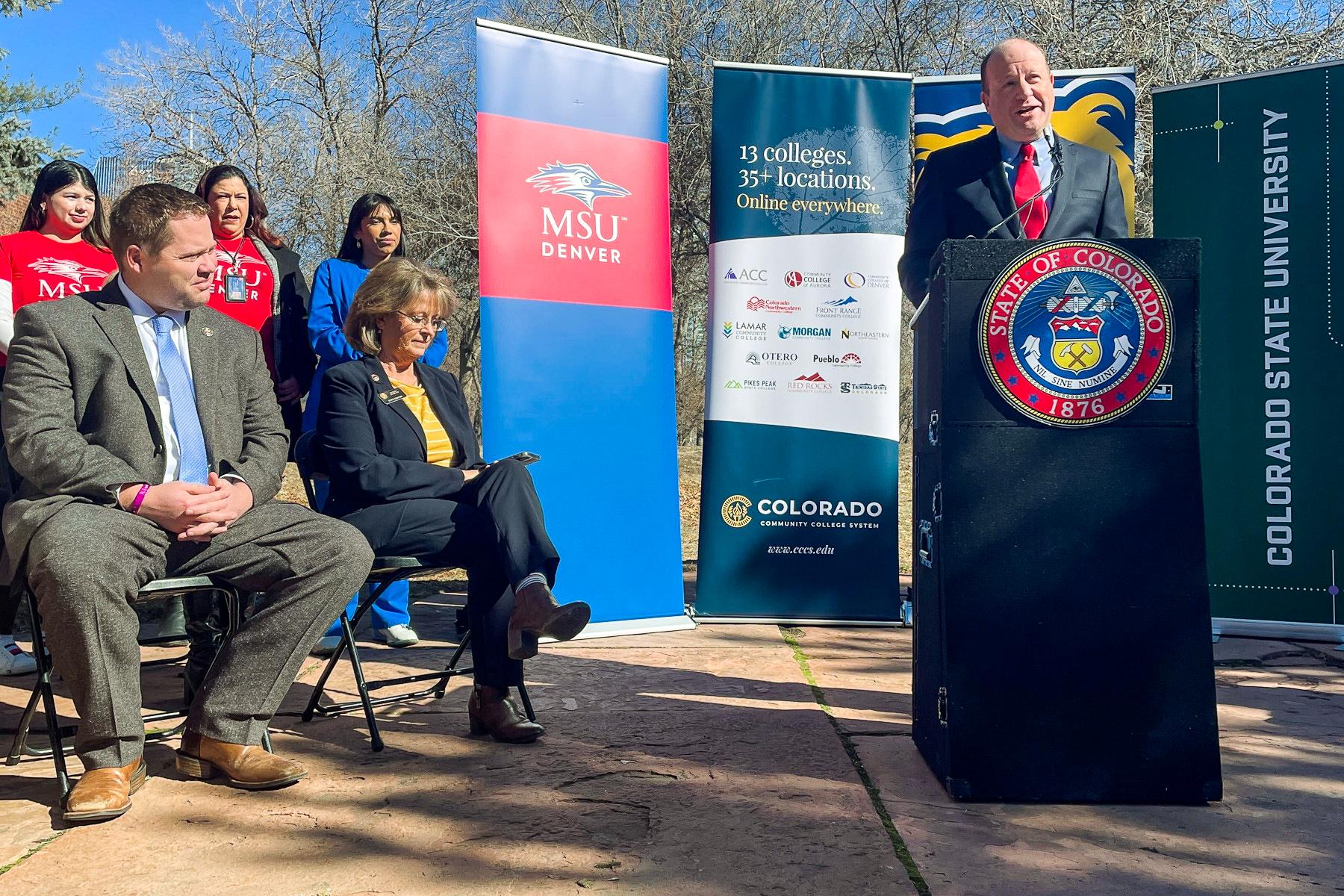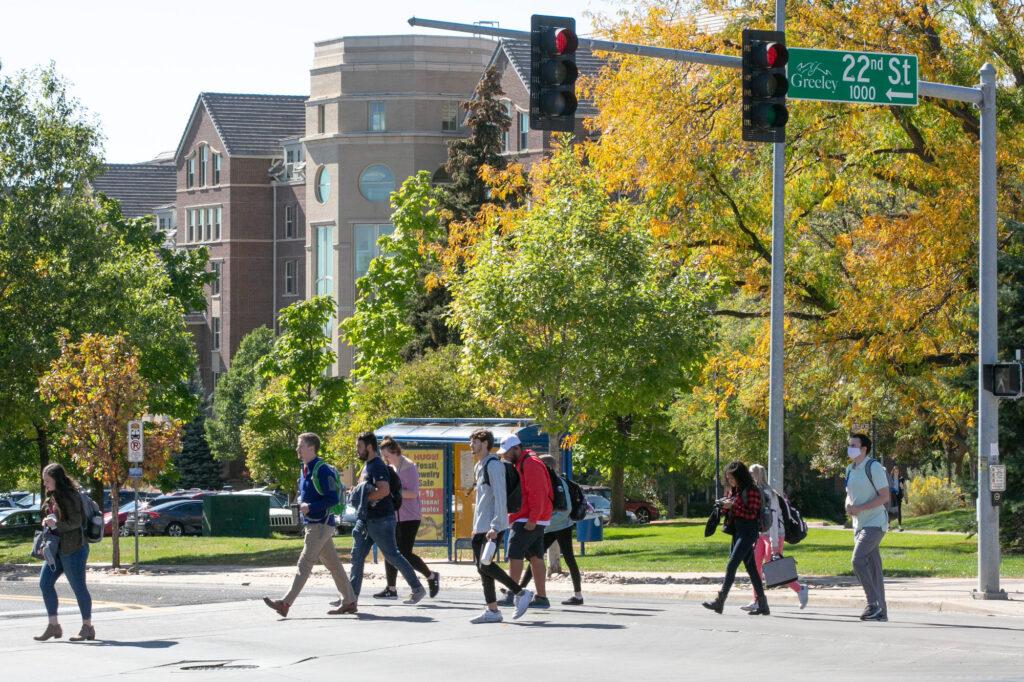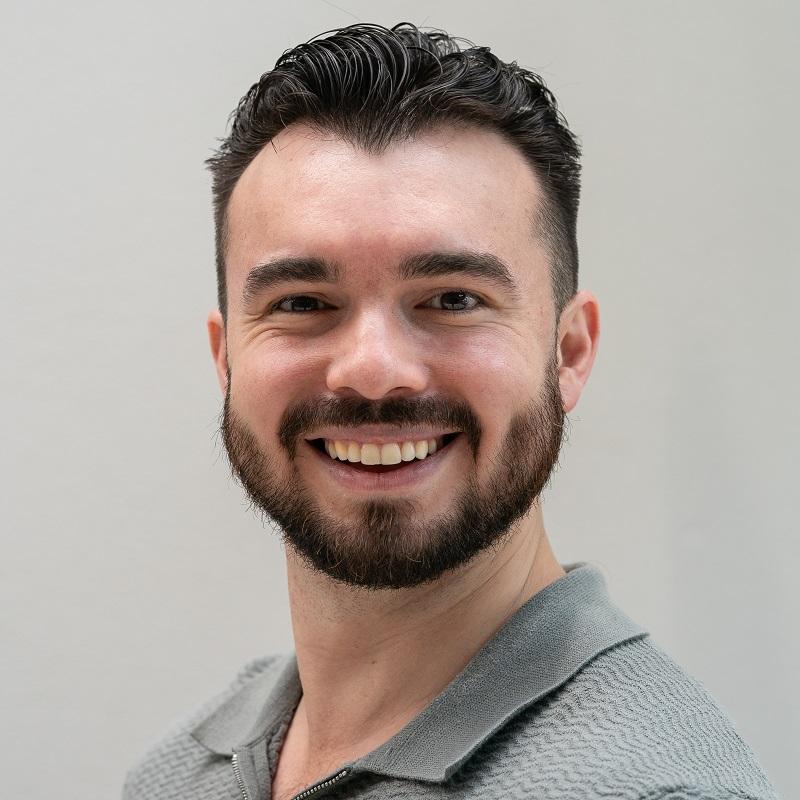
Updated at 4:26 p.m.
On Monday, Governor Jared Polis joined several of the state's higher education leaders and a group of bipartisan lawmakers to announce a bill that would bolster health care training at Colorado’s higher education institutions. The proposed plan includes funding for a new medical school at the University of Northern Colorado.
The plan to open a new College of Osteopathic Medicine at UNC is aimed at addressing the health care workforce shortage affecting Colorado and the nation. It also includes funds to support four other medical and veterinary campuses across the state, including at Metropolitan State University of Denver and Colorado State University.
"With this plan, Colorado will train more world-class doctors, nurses, veterinarians, and other health professionals to provide Coloradans with the care they need,” said Polis in a statement. “From Denver to Fort Collins, Greeley, and Trinidad, these new opportunities will attract students from Colorado and across the country to our communities.”
The new UNC medical school would graduate about 150 new doctors each year, according to Polis.
Additional funds included in the plan would allow Trinidad State to expand the student capacity of its Allied Health Programs by 50 percent, the governor said, improving health care access in the San Luis Valley. MSU’s Health Institute Tower will use its funds to increase its student capacity by about 25 percent.
"This Certificate of Participation bill would make historic investments across the state in four Colorado institutions of higher education to bolster our healthcare workforce and support Colorado’s students and caregivers," said the governor's statement. "The bipartisan legislation would support the College of Osteopathic Medicine at UNC, the Health Institute Tower at MSU Denver, the Veterinary Health Education Complex at CSU, and the Valley Campus Building Addition at Trinidad State."
The governor’s announcement said the United States is “projected to have a shortage of nearly three million healthcare workers over the next five years and 41,000 additional veterinarians by 2030.”
It went on to say that by 2026, Colorado will need more than 10,000 additional nurses, noting that 40 percent of Coloradans currently live in an area with a shortage of health workers.
The bill’s total cost will be about $247 million.
Polis announced the plan on MSU’s campus, alongside Rep. Mary Young, Rep. Lindsay Daughtery, Sen. Kyle Mullica, and Sen. Barbara Kirkmeyer.
They were joined by Colorado State University System Chancellor Dr. Tony Frank, MSU President Janine Davidson, UNC President Andy Feinstein, Trinidad State College President Dr. Rhonda Epper, and Colorado Community College System Chancellor Joe Garcia.
What is osteopathic medicine?
There are two ways to become medical doctors — the most common way is by obtaining an M.D. from a traditional school of medicine. The second method is to get a D.O. from a school of osteopathic medicine.
Doctors with an M.D. or a D.O. are both licensed to practice medicine. Osteopathic doctors take a slightly different approach to medicine than their M.D. counterparts; their school of thought believes that the mind, body, and spirit are all interconnected and treating one part of the body benefits the whole of itself.
Most D.O.s go on to practice in primary care offices. In addition to diagnosing illnesses and prescribing medicine, some D.O.s practice hands-on treatment methods that can be used to manipulate joints, soft tissue, and muscles to ease discomfort.
UNC’s osteopathic medical school will be the second of its kind in Colorado. The other osteopathic medical school is the Rocky Vista University College of Medicine, a private, for-profit university in Parker. The only other medical school in Colorado is the University of Colorado’s Anschutz School of Medicine. Andy Feinstein, UNC’s president, said the medical school will help address a growing need in Greeley and surrounding Weld County.
“Many of us know anecdotally that there is a shortage of health professionals, but it was shocking for me to learn that over 65 percent of Colorado's need for physicians is going unmet,” he said.

The university’s first class of osteopathic students is expected to begin in 2026. UNC started exploring the possibility of opening a medical school in 2021. Representatives for the school said it would cost a minimum investment of $200 million to open, with part of that covered through donor gifts.
Dr. Beth Longenecker obtained her D.O. from Ohio University College of Osteopathic Medicine and will serve as UNC’s osteopathic medical school’s founding dean.
Veterinary care in Colorado will also see a much-needed boost
The bill also creates funding for expanded veterinary care programs at Colorado State University.
In 2023, the Fort Collins university’s Animal-Human Policy Center released a survey outlining the workforce challenges the industry faced. Seventy-one percent of respondents said their veterinary clinic has to decline clients every week because they’re unable to fit them into their schedules.
Polis said the funding bill aims to address those needs.
“We hope to expand virtual access to veterinarians, mid-level practitioners, a number of different ideas on the table, but one thing that's needed for anything is simply more veterinarians,” he said.
CSU will use the funds for its planned veterinary health complex on its south campus. The 300,000-square-foot expansion will see the construction of a new veterinary education center, as well as a livestock teaching hospital. The complex is expected to open in 2028.
- Free college in Colorado? It’s covered if you’re interested in teaching, firefighting, law enforcement, construction or forestry
- Where are the nation’s primary care providers? It’s not an easy answer
- Lawmakers eye fix so Colorado colleges can launch adult education diploma program
- Colorado leads the nation in college-educated residents, but gaps remain









